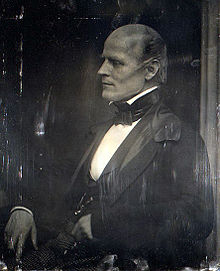Charles Sprague (poet)
| Charles Sprague | |
|---|---|

Daguerreotype of Charles Sprague by Southworth & Hawes, circa 1850
|
|
|
|
|
| Signature | |
Charles Sprague (October 26, 1791 – January 22, 1875) was an early American poet. He worked for 45 years for the State and Globe Banks and was often referred to as the "Banker Poet of Boston". His odes and prologues won several competitive prizes and were collected and published in 1841 as The Writings of Charles Sprague.
He was born in Boston on October 26, 1791. He was a descendant of some of America's founding fathers, including his father, Samuel Sprague (participant in the Boston Tea Party and Revolutionary War), Richard Warren (Mayflower passenger) and the Reverend Peter Hobart and William Sprague of Hingham. He received a common-school education, beginning at age 10 at the Franklin School in Boston. He was taught by Dr. Asa Bullard and Mr. Lemuel Shaw who later became Chief Justice of the Massachusetts Supreme Judicial Court. He lost the use of his left eye by an accident at age 10.
His formal education ended at thirteen when he was apprenticed to a dry goods merchant, Messrs Thayer and Hunt. Here he gained his first practical knowledge of business. Later he formed a co-partnership with William B. Collander in the grocery business. He married Elizabeth Rand in 1814 and had four children, two dying in childhood. In 1819 be began working for the State Bank as a teller and when the Globe Bank was established in 1824 was employed there as a cashier. He remained there, becoming an officer in the institution, until 1865 and was often referred to as the "Banker Poet" of Boston. He resigned his bank position, when at 73 years and growing infirm with age, he didn't want to undertake the labors of a new regime of banking under national laws. He enjoyed the comforts of home life, surrounded by his books, until January 22, 1875, when after a short illness he died at 84.
His first recognition for poetry came when he won a prize for the best prologue at the opening of the Park Theater in New York City. His first printed efforts were published in the Centennial, Boston Gazette, and The Evening Gazette as early as 1811. Upon the occasion of the triumphal entry of Lafayette into Boston, in 1824, he wrote the inscription for an arch that hung over the streets of Boston.
...
Wikipedia
